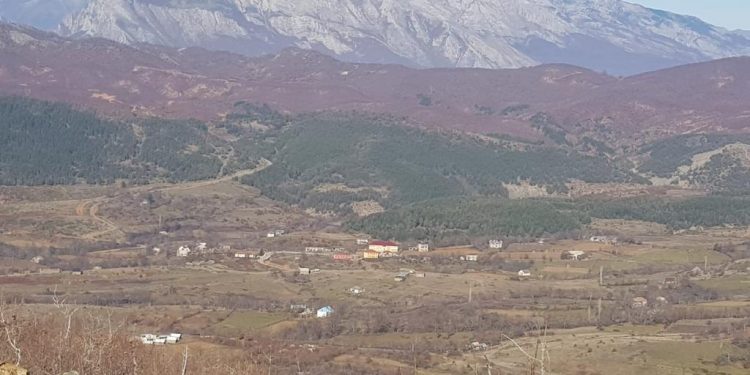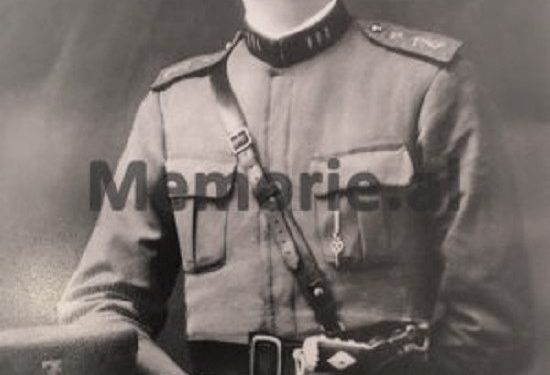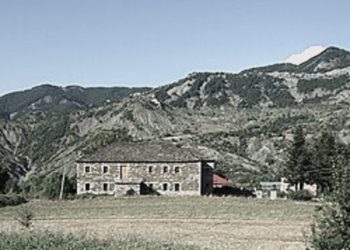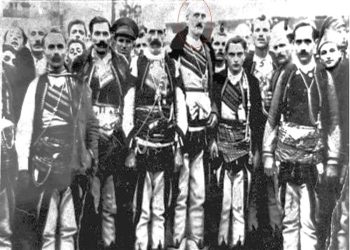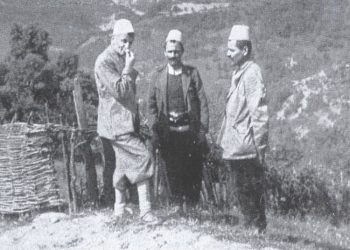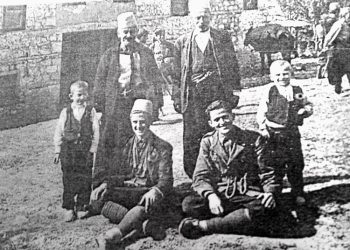Dashnor Kaloçi
Memorie.al/On the national road Shkodër – Pukë – Kukës, at the bridge of Bardhet, somewhere to its left, begins the road that leads to the area of Iballa (37 km. Away from there), one of the deep provinces of Puka district, which passes through the tourist Kryeziu, winding in its mountains and Iballa, which is full of pine, fir and beech forests, where it seems that nature has unsparingly unfolded all its beauties. As we travel to those parts of stunning natural beauty, as soon as we reach Qafë-Shari, Iballa appears before our eyes. A pit field 800 m. above sea level, surrounded by high mountains, where the river passes in the middle of it and on a hill, like on a balcony, is Lake Iballa, whose water is used to irrigate the agricultural lands of that area. Throughout that trip to the mountains that stretch between Iballa and Kryeziu, as everywhere in Albania, we see that even these centuries-old forests, which constitute a great eco-tourist potential, have not escaped damage, from illegal logging, fires, etc…
Harmony of the two religions in Iballa
In Iballa lives a community with two religions: (Muslims and Catholics) who for centuries have lived in complete harmony and peaceful coexistence with each other. There are three cult objects: in addition to the mosque, the object of the Muslim community of Iballa, there is also the Church of Thaçi, which is very old and serves as a major pilgrimage center, where every June 13, (as well as the Church of Saint Ndout on the mountain above the town of Laç i Kurbinit), welcomes hundreds of pilgrims and visitors of all faiths. In addition to Thaçi’s church, there is also the Koprat Church, which serves as the center of that religious institution of the Catholic faith throughout the Iballa area. Exactly there, a few decades ago, Bishop Dom Lazër Mjeda also served and in its vicinity is the house of a large and well-known family, Pemati.
The opening of the first Albanian school in Iballa in 1903
One of the historical events with which the name of Iballa appears in the history of Albania, is undoubtedly that of the opening of the first Albanian school there in 1903, an event which, due to its historical importance, exceeds not only the borders of Iballa and the whole district of Puka, but also of Northern Albania.
Regarding the history of this school and those who made its opening possible, among others, the Catholic clergyman Fra Lovro Gavran, OFM, also stopped and wrote at length, who in his study book of historical and cultural character, entitled : “The parish of Iballa”, (publications, Iballa 2000), among others, in the chapter: The first school of Iballa), p. 20, writes: “Both Turkey and the Albanian intelligentsia knew very well that – in addition to religion – the greatest national awareness and patriotic love is aroused by education in the mother tongue. Therefore, the friars, wherever possible, tried to open Albanian schools, while the Turkish government prevented that work by all means. In 1902, however, with the recommendation of the then Parish Priest of Iballa, Father Zef Mesit, Frrok Kole Pemati received the consent of the Assistant Bishop, Monsignor, Lazër Mjedës, for the opening of the first Albanian school in Iballa. The bishop also provided the teacher: Kole Zeza, from Zez of Puka, while Frrok Kola, took over the construction and security of the school. This school is also mentioned by Don Gaspër Gurakuqi, in the book “Diocese of Sapa, 1291 – 1941”, on p. 57, describing the activity of Mons. Lazër Mjedës (1901 – 1905): ‘Under Mjeda, the new cell of Nënshati and Laç was hit: the Dajç cell was transformed into the modern one: the Iballa school was built, etc.’. In the spring of 1903, Kol Zeza taught in Iballa the first generation of students in the Albanian language and taught about 43 students there “.
In addition to the above we quoted, regarding the opening of the Albanian school of Iballa, (which with several interruptions for various reasons I continue its educational activity to the present day), in his book, Fra Lovro Gavran, OFM, has also presented a song with seven verses, which is dedicated to that school, which summarizes a brief history of the opening of the school and its main contributors. In this regard, among other things, it says:
“Q’ai Kol Nika with Frrok Kolën,
they took the Bishop’s hand,
that in Iballa he wants me to go to school:
make me go to school, make me sarraj –
they do the work of the Turks easily,
The drum does not take anyone by the neck without guilt “.
Other contributors to the Albanian school in Iballa
In addition to the book by Fra Lovro Gavran, OFM, regarding the opening of the first Albanian school in Iballa in 1903, there are other sources and evidence, documentary and oral, which have come down to the present day. In addition to Frrok Kol Pemati, as one of the main initiators and contributors to the opening of that school, they also shed light on the role of Dom Lazër Mjedë, Bishop of Sapa who also administered Iballa, who was busy finding textbooks that would teach children, material base, such as: books, notebooks, benches, desks, etc.
For the opening of that school, Dom Lazër Mjeda relied and found great support in Frrok Kol Pemati, whose house was close to the Church and he undertook to help Dom Lazër to the end, by all means, in the initiative that he had received. Thus, Frrok Kola bought with his own money the land where the school building would be built, without damaging the Church and its properties economically at all.
But according to some testimonies and oral sources that have come down to us, it was Frrok Kola who asked Dom Lazri to open the first Albanian school in Iballa, promising his unstinting support, as he was not only a patriot. and an educator who enjoyed great authority in that area, but also had a well-off family. But together with Frrok Kol Pemat, a great help as initiators for the opening of that school were also given by Palush Pjetra e Vocër Prela of Iballa and Kol Nik Alija, of Flet.
This was also made possible thanks to the great support and help of the Iballa community, who were eager to educate their children to learn to read and write, and as a result, in 1903, 43 students were enrolled in the school and started teaching, who were not only from Iballa, but also from the surrounding villages, such as Toplana, etc.
Personalities of history and culture that Iballa has produced
The history of Iballa is closely related to several personalities from different fields of life, such as politics, art, culture, education, etc., and starting from the chronology of the course of historical events over the years, undoubtedly a major place is occupied by that of Frrok Kol Pematit, as his patriotic and patriotic activity begins in 1903, with the opening of the first Albanian school in Iballa. Also, apart from Frrok Kola, Iballa is also known as the place of origin of Kol Bibë Mirakë, a very well-known name and character of the Albanian history and politics of the last century, as before the War when he had served as Minister of Foreign Affairs Internal Affairs in the Albanian governments under Italian occupation, as well as after 1944, when he was a political emigrant in Italy, etc.
The name of Iballa before the ’90s, is also associated with the figure of Tom Nikolla, rhapsodist and popular instrumentalist, who for several decades, has been part of the State Ensemble of Folk Songs and Dances of Albania, (decorated with the Gold Medal in Russia), even winning several awards as a performer, in various activities and concerts outside Albania, such as in Dijon, France, where the State Ensemble from Albania, won the “Golden Necklace”, among all countries that competed there.
Another well-known name that is closely related to Iballa, is that of Mark Zef Maluta, virtuoso artist and popular dancer, who has been a very successful MP in many different activities and performances, not only in Iballa and the whole district of Puka, but also in the scenes of different cities of Albania, such as the National Folklore Festival of Gjirokastra, etc., and up to international activities outside Albania.
From Iballa is also the origin of Fran Mirakaj (1916-1946, layman of the Shkodra-Pult Archbishopric), considered one of the ’40 Martyrs of the Albanian Catholic Church ‘, killed by the communist dictatorship of Enver Hoxha, who were declared Saints and we were blessed by the Vatican on November 10, 2002. Photo of Fran Mirakaj, was on the Boulevard “Dëshmorët e Kombit” in Tirana, during the visit of the head of the Holy See, Pope Francis in Albania, on September 21, 2014, e which was also his first visit to Europe.
Iballa also has its history, with cultural and ethnographic traditions stretched over several centuries, where one of the most important historical events that distinguishes it, not only in the district of Puka, but also beyond the North of Albania, undoubtedly which is the opening of the first Albanian school in 1903 and the roots of the history of this school, have their origins in Koprat.
The patriotic activity of Frrok Kola
In addition to the great role that Frrok Kola played in the opening of the first Albanian school of Iballa in 1903, he stood out as a patriot and patriot in some of the main events in the history of Albania, such as the declaration of Independence in 1912 by the elder wise Ismail Qemali. Thus, only ten days later, on December 8, 1912, Frrok Kol Pemati was in Qelëz of Puka, together with Zenel Aga of Iballa, where he participated in the raising of the flag that took place there, together with some patriots of that district of the district. of Puka who had fought for freedom and independence. From some other sources, it is known that Frrok Kola was a close friend and collaborator of Bajram Curri, being by his side as an activist in some of the political movements of the time. Likewise, during the period of the Zog Monarchy, the family of Frrok Kol Pemati, was known as a patriotic and nationalist family, which had many friendships with other large and famous families, not only in Iballa and the district of Puka, but also beyond, throughout the North of Albania, up to the Gjakova highlands in Kosovo.
Persecution of the Pemati family, in communist internments and prisons
Unlike the period of the Zog Monarchy and the one under the occupation of the country (1939 – 1944), where the Pemati family enjoyed great authority, also because of the patriotic past and the great support and friendships they had with many of the nationalist families and with the name of Puka, Mirdita, Has, Shkodra, Gjakova highlands, etc., with the coming of the communists to power at the end of 1944, for them everything would change and ‘dark days’ would come’. Thus, from 1945 onwards, the large Pemati i Iballa family was targeted by the communist regime of Enver Hoxha together with the Mirakaj family, where many members of those two large families and tribes would end up in prison. and internment camps for years, until the fall of the regime in 1990.
In this regard, Zef Pemati, one of the suckers of this large family and with the name of Iballa, among other things testifies: “The attack of our family by the communist regime of Enver Hoxha, starts from 1952, when we were declared kulaks, while the persecution begins with Stak Pjetër Pemat, and his brother, Jaku, who were imprisoned and interned for years. Jaku spent 20 years in prison and died in exile. Simultaneously with these, the persecution of Pjetër Stak Pemati and his wife, Shuka, began, who suffered in the internment camps of Berat, Tepelena, Myzeqe and Tirana. Peter’s wife, Shukja, was the daughter of Mark Dod Alia from Kryeziu (one of the most prominent men in the Puka district), who after being declared “enemy of the people”, was imprisoned by the communist regime of Enver Hoxha when he was at the age of 90, serving a sentence of six years in political prison, which he did in the Ballsh camp, etc.”.
In addition to Pjetër Staka, his two brothers, Ludoviku and Gjeloshi, mother Bjeshkë, and their sister, Gjyste Pemati, were also persecuted while suffering in internment camps. The same “fate” had their cousin, Mark Zef Pemati, who suffered 20 years in the prisons of the communist regime before the ’90s.
According to Zef Pemati but also some other testimonies of the inhabitants of Iballa etc., in 1967, when the Agricultural Cooperative of Iballa was formed, the family of Stak Pjetër Pemati were not allowed to enter that agricultural economy, as they had declared them as kulak, forcing them to work in the heaviest jobs, to provide only the bread of the mouth. Likewise, on the part of the communist regime, the denigration continued of the children of the large Pemati family, who had the “luck” of their parents. Based on this, Zef Pemati and his brother, Leka, were not allowed to continue school, although they were talented not only in lessons, but also in music, as popular artists and instrumentalists.
Commemorative activity on the occasion of the 100th anniversary of Iballa school
The school of Iballa that was opened in 1903, thanks to the contribution given especially by Frrok Zef Pemati, continued its teaching activity, coming to the present day, where that school has been rebuilt and is one of the largest of all district of Puka.
In the school year 1973 – ‘74, for the first time a festive commemorative activity was organized there, on the occasion of the 70th anniversary of the opening of that school. A similar commemorative activity on the occasion of the opening of that school was repeated in 2003, on the occasion of its 100th anniversary, where in addition to residents of the area and surrounding villages as well as local authorities, it was attended by many former students, its teachers and leaders over the years. On that occasion, by the directorate of that school, it became possible to open its museum, with various relics, documents and photographs. Based on all the data that we presented in this article about the history of the school of Iballa, we think that it is in the honor and dignity of the inhabitants of that area, as well as the local authorities, to name that school: ‘Frrok Kol Pemati ‘/Memorie.al





